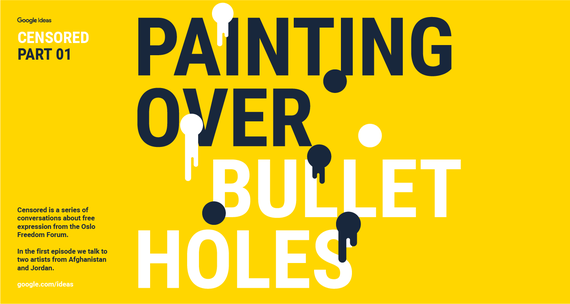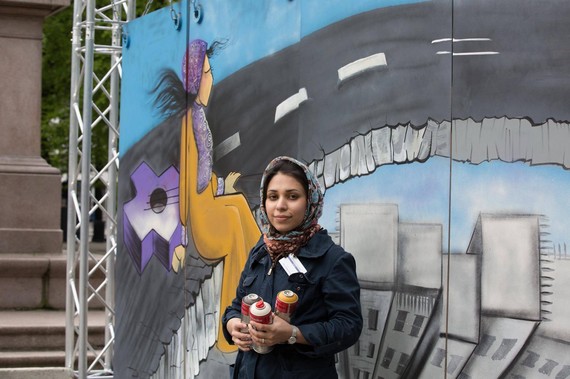 This post originally appeared on Medium and is part of a new series from Google Ideas.My colleagues and I traveled to the Oslo Freedom Forum to meet with a diverse group of policy makers, artists, journalists, writers, entrepreneurs, activists, hackers, and diplomats. What follows is the first of a series of conversations with some of the world's most prominent experts on the global fight for free expression and the role that technology plays on both sides of the struggle.Shamsia Hassani barely speaks above a whisper when she tells the story of holding her mother's hand as the opera house crumbled around her after being bombed by the Taliban. Hassani, now 27, spent her childhood in exile in Iran, eventually returning to her native Afghanistan to attend art school and paint vivid, triumphant portraits of faceless women. Although she studied traditional painting and drawing, she prefers the medium of graffiti art, creating her portraits on the walls of shops and fortified compounds in downtown Kabul. She often paints over bullet holes.
This post originally appeared on Medium and is part of a new series from Google Ideas.My colleagues and I traveled to the Oslo Freedom Forum to meet with a diverse group of policy makers, artists, journalists, writers, entrepreneurs, activists, hackers, and diplomats. What follows is the first of a series of conversations with some of the world's most prominent experts on the global fight for free expression and the role that technology plays on both sides of the struggle.Shamsia Hassani barely speaks above a whisper when she tells the story of holding her mother's hand as the opera house crumbled around her after being bombed by the Taliban. Hassani, now 27, spent her childhood in exile in Iran, eventually returning to her native Afghanistan to attend art school and paint vivid, triumphant portraits of faceless women. Although she studied traditional painting and drawing, she prefers the medium of graffiti art, creating her portraits on the walls of shops and fortified compounds in downtown Kabul. She often paints over bullet holes.
"No one had ever done graffiti in Afghanistan before, so people have no idea whether it's legal or not," the artist explains. " She paints almost exclusively women and relies heavily on the image of the burka or chadri, the full-body cloak that the Taliban forced Afghan women to wear whenever they were in public. Part of Hassani's goal in creating these fantastical portraits of women still in conservative garb, sometimes with angular figures and suggestive poses, is to expand women's sense of liberty beyond the garments that cover them physically.
"A burka isn't a cage, if you take off a burka it isn't freedom. Freedom is in the mind." Shamsia Hassani outside of the Oslo Freedom Forum.Shortly after I met Ms. Hassani, I met Suleiman Bakhit, a Jordanian comic book entrepreneur who told me that he was on a mission to replace the heroes that too many young Arab men worship -- the founders of ISIS, or Daesh, and Al Qaeda -- with his comic book characters. Physically, he couldn't have been more distinct from Hassani. Bakhit is tall, brash, and confident, with a long scar along one of his eyes that he received after being attacked with a razor blade outside his offices in Amman, presumably, he says, for promoting "moderate messages." He speaks in long, fluent sentences about how growing up as the son of Jordan's former prime minister meant that he couldn't pursue his lifelong passion for graphic novels, how the Middle East lacks fictional role models for young children, and how superheroes might just save the world after all.
Shamsia Hassani outside of the Oslo Freedom Forum.Shortly after I met Ms. Hassani, I met Suleiman Bakhit, a Jordanian comic book entrepreneur who told me that he was on a mission to replace the heroes that too many young Arab men worship -- the founders of ISIS, or Daesh, and Al Qaeda -- with his comic book characters. Physically, he couldn't have been more distinct from Hassani. Bakhit is tall, brash, and confident, with a long scar along one of his eyes that he received after being attacked with a razor blade outside his offices in Amman, presumably, he says, for promoting "moderate messages." He speaks in long, fluent sentences about how growing up as the son of Jordan's former prime minister meant that he couldn't pursue his lifelong passion for graphic novels, how the Middle East lacks fictional role models for young children, and how superheroes might just save the world after all.
Bakhit and his graphic novel production company, Aranim Media Factory, have invented a universe of new, Arab superheroes that promote the values of tolerance, peace, and the respectful treatment of women. Their goal is to create a new, shared vocabulary of heroes and noble causes that deprive jihadist propaganda of the vacuum it needs to reach impressionable minds.
Suleiman Bakhit speech at Oslo Freedom ForumCertainly that's the right sentiment. But can it make any difference? Maybe not. But we might also be missing the point. Bakhit and Hassani are both proving every day that freedom of expression isn't just a right, it's something you exercise, like a muscle. Artists invent new vocabularies that give shape to the world around them, and here were two artist using spray paint and comics to reimagine their country's violent history and leave it with portraits of itself -- vivid, aspirational, and unfinished.
To hear more from Shamsia Hassani and Suleiman Bakhit listen to our full interviews below. Special thanks goes out to Human Rights Foundation, organizers of Oslo Freedom Forum.